Utagawa Kuniyoshi (歌川国芳) (artist 11/15/1797 – 03/05/1861)
Kaku Kyo (郭巨) on the left and Kyō Shi (姜詩) on the right from the series The Twenty-four Chinese Paragons of Filial Piety (Morokoshi nijūshi-kō - 唐土廾四孝)
1847
13.5 in x 9.5 in (Overall dimensions) Signed - on the left panel only:
Ichiyūsai Kuniyoshi ga
一勇斎国芳画
Artist's seal: on right panel only: kiri
Inscription: Ryūkatei Tanekazu
Kuniyoshi Project
Museum für angewandte Kunst, Vienna - left panel
Museum für angewandte Kunst, Vienna - right panel
Tokyo Metropolitan Library - right panel
Tokyo Metropolitan Library - left panel
Museum of Fine Arts, Boston - right panel
Museum of Fine Arts, Boston - left panel
National Museum of Asian Art - right panel
Musées Royaux d'Art et d'Histoire (via Ritsumeikan University) - right panel only - trimmed
Musées Royaux d'Art et d'Histoire (via Ritsumeikan University) - left panel only - trimmed
Art Institute of Chicago - right panel only
Art Institute of Chicago - left panel only
Nationaal Museum van Wereldculturen (Rijksmuseum Volkenkunde, Leiden) via Ritsumeikan University - right panel only Below is R. Keller Kimbrough's translation of an early edition of the Nijūshikō. It does not specifically apply to these Kuniyoshi prints except in the most general terms.
[9] Kyō Shi 姜詩 (Jiang Shi)
A sweet spring erupts beside the house,Kyō Shi was filial toward his mother. She always wanted to drink water from the river, and to eat fresh minced fish. Thus, Kyō Shi would send his wife to fetch water from a river that was six or seven leagues away, and he would have her carefully prepare minced fish and give it to his mother. Together, they were constantly diligent in their service. One time, beside Kyō Shi’s house, water suddenly sprang from the ground and flowed like a river. Every morning there were carp in the water, so they would catch them and give them to Kyō Shi’s mother. These amazing things were gifts from Heaven, and they occurred because Heaven was moved by the filial piety of Kyō Shi and his wife.
and one morning there are two carp.
The son knows well how to serve his mother;
his wife, too, is filial toward her mother-in-law.
[15] Kaku Kyo 郭巨 (Guo Ju)
Wishing to provide in their poverty,Kaku Kyo was from a place called Kadai. His family was poor, and he supported his mother. His wife bore a single child, who was now three years old. Kaku Kyo’s old mother doted on her grandchild, and she would share her food with him. One time Kaku Kyo said to his wife, “Because we are poor, we hardly have enough food even for our mother, or so I’ve thought. Nevertheless, she takes some and gives it to her grandchild, so that there really isn’t enough. This is all because we have a little one. In short, since we are husband and wife, we’ll surely have another child someday, but we’ll never have another mother. So, I would like to bury our baby and take good care of our mother.” The wife was indeed sad, but she did not disobey her husband, and they took their three-year-old child out for burial. Holding back his tears, Kaku Kyo began to dig, whereupon he discovered a golden vessel. There were astonishing characters inscribed on the object. They read: “This a gift from Heaven for the filial Kaku Kyo. It is not to be seized by any official or taken by anyone else.” This meant that because Heaven had granted the vessel to Kaku Kyo, it was not to be taken by any other person. Kaku Kyo and his wife accepted the vessel with joy, and they went home together without burying their child. People say that after that, Kaku Kyo served his mother more filially than ever.
they would bury a child to prolong their mother’s life.
Heaven granted them a golden vessel,
the lovely light of which illumined their impoverished home.
****
The text below was composed by Ryūkatei Tanekazu (柳下亭種員: 1807-58).
The text on the right panel reads: 姜詩(きやうし) 父(ちゝ)没(ぼつ)して其母(そのはゝ)に仕(つかへ)て純孝(じゆんかう)かぎりなし妻(つま)☆氏(ろうし)姑(しうとめ)に奉(ほうず)ること窺(きは)めてあつし母好(このみ)て遠(とほ)き江(え)の水を飲(のむ)☆氏(ろうし)はる/\江中(ごうちう)の水を汲(くみ)て母にまゐらす母又魚(うを)の膾(なます)を嗜(たしめ)り姜詩(きやうし)常(つね)に生魚(なまうを)を求(もと)め膾(なます)につくりて母に薦(すゝむ)かくすること年あり或時(あるとき)忽(たちま)ち家(いへ)の側(かたはら)に甘泉(あまきいずみ)湧(わき)いでその味(あぢ)江(え)の水にひとし且又(かつまた)日々(ひゞ)に鯉二頭(こひにとう)を躍(をどら)しむかゝれば他(ほか)を求(もとめ)ずして二品(ふたつのものを)母(はゝ)へそなへしとなん 種員謹記
The book entitled The Twenty-four Paragons of Filial Piety was written by the Chinese scholar Guo Jujing during the Yuan Dynasty. His pen name was Yizi, and he is known in Japan as Kaku Kyokei. The book recounts the self-sacrificing behavior of twenty-four sons and daughters who go to extreme lengths to honor their parents, stepparents, grandparents, and in-laws. Many of the images in this series appear Western in style, rather than Japanese, and were probably copied from Italian prints. The prints in this edition appear to have been printed two per ōban sheet (about 9.5 x 13.5 inches) and folded to chuban pages (about 9.5 x 6.75 inches). The were once bound together in an album.
Japanese name: Kwakkyo
Chinese name: Kuo Chü
Kwakkyo, lamenting the fact that his aged mother was going hungry because food was being eaten by his infant son, prepared to kill the baby. While digging the grave he discovered a pot of gold with an attached note (or inscription) that the treasure was meant for him.
Robinson: S60.14
Japanese name: Kyōshi
Chinese name: Chiang Shih
Kyōshi, along with his wife, traveled great distances to get good water and fresh carp desired by his aged mother. However, one day a fresh spring suddenly bubbled up in their own garden and provided excellent water as well as fish.
Robinson: S60.9
[The above English-language information is all taken directly from the Kuniyoshi Project.]
The text on the panel on the left reads: 郭巨(くわくきよ) 赤貧(せきひん)にして旦暮(たんほ)の食(しよく)うすし曽(かつ)て三才の児(こ)あり巨(きよ)が母(はゝ)是(これ)を愛(あいす)ること深(ふか)く己(おのれ)の食(しよく)をわかち与(あた)ふ巨(きよ)妻(つま)にいふやう貧(ひん)なれば母(はゝ)を養(やしな)ふにさへ心にまかせざるに我子(わがこ)又(また)母(はゝ)の食(しよく)をへらす児(こ)はえべし母(はゝ)は又えべからず然(しかじ)我子(わがこ)を埋(うめ)んにはと妻(つま)これに随(したが)ふかくて坑(あな)を堀(ほる)こと三尺余(あま)りにして黄金の釜(かま)をえたり上に記(しるし)て曰天賜孝子郭巨(てんかうしくわくきよにたまふ)と是(これ)をもて小児(わがこ)をも埋(うめ)ず母をも安(やす)く養(やしな)ひしとかや 種員謹記
Historical - Social - Ephemera (genre)
Fushimiya Zenroku (伏見屋善六) (publisher)
Ryūkatei Tanekazu (柳下亭種員) (author)
Nijūshikō (二十四孝: The twenty-four filial exemplars) (genre)
